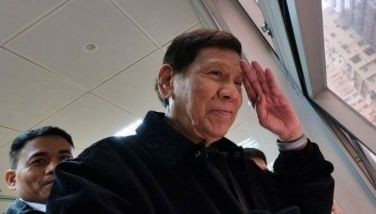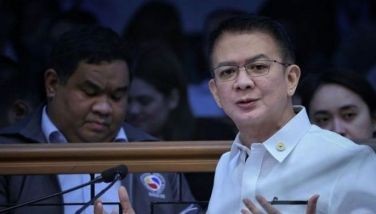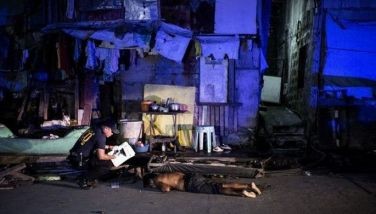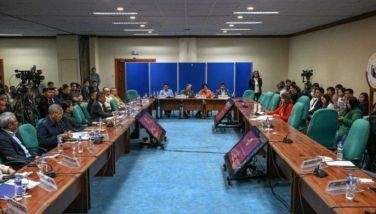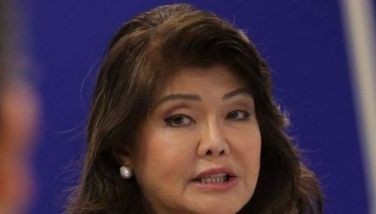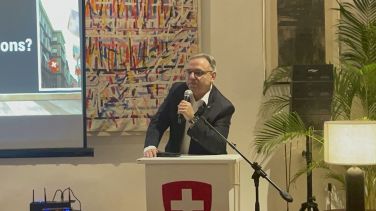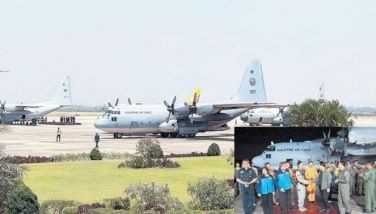What Duterte gets wrong about the CHR
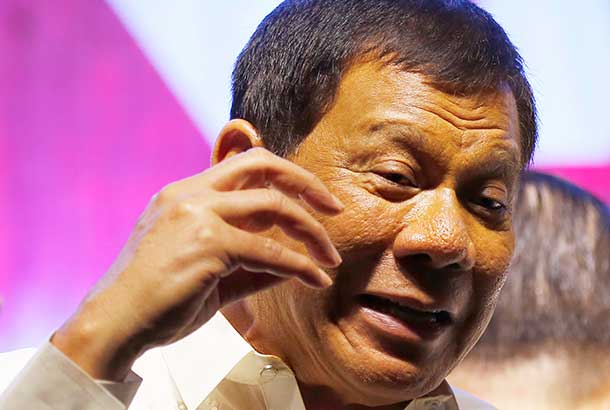
Philippine President Rodrigo Duterte addresses thousands of protesters following his state of the nation address outside the Lower House Monday, July 24, 2017 in Quezon city, northeast of Manila, Philippines. Thousands of protesters march towards the Lower House with an effigy of Duterte to demand that he deliver on a wide range of promises he made in his first state of the nation address last year, from pressing peace talks with Marxist guerrillas, which is currently on hold, to upholding human rights and the rule of law. AP Photo/Bullit Marquez
MANILA, Philippines (First Published July 25, 6:59 p.m.) — President Rodrigo Duterte threatened to abolish the Commission on Human Rights, which has been critical of his sexist jokes and the killings associated with his brutal war on drugs.
READ: Duterte vows to keep drug war amid human rights concerns
At a press conference following his State of the Nation Address on Monday, Duterte went on to rebuke the CHR lengthily, while asking it to perform activities outside its mandate.
Duterte's statements against the CHR repeat and reinforce common misconceptions among his officials and supporters who have defended his anti-narcotics campaign, controversial off-color remarks and views on rights.
READ: Rape ‘jokes’ normalize objectification of women, CHR tells Duterte
1. That the president can block CHR investigations
Duterte said on Monday that he would not allow members of the military to be investigated for possible human rights violations, saying the body should go through him before getting to his men.
"Padaanin niyo sa akin lahat. Lahat. Maski sino. Pulis o imbestigahin niyo, padaanin niyo dito. You address it to the [Department of the Interior and Local Government], to me. Attention DILG. Pag sinabi kong huwag kayo magpa-imbestiga, huwag kayong magpapaimbestiga," Duterte said.
READ: Duterte: Troops, cops need clearance to appear before CHR
The president, clearly irked by human rights defenders' disapproval of some of his policies, also urged the CHR to instead investigate an ambush that hurt members of the Presidential Security Group and speak out on atrocities committed by terrorists locked in an urban combat with the military in Marawi City.
"Better do an equal job here. It does not say that your investigations will be solely focused on government men," Duterte said.
It is the Constitution, under Section 17, and not the executive that grants the CHR independence from any branch of government, while Section 18 mandates it to probe "all forms of human rights violations involving civil or political rights." This is why the body calls out perceived violations of the rights of due process of an accused.
2. That speaking out vs crime by non-gov't actors is not CHR's main function
In the same media conference, the president also challenged the CHR to investigate into attacks committed by non-state actors like the New People's Army.
Particularly irritating for the irascible Duterte was the alleged non-action of the CHR on attacks against Philippine security forces, with the latest being an attack by suspected communist militants on his security detail in Arakan, Cotabato province that hurt several Presidential Security Group personnel.
READ: Duterte 'lowest of the low' over threat to bomb lumad schools, Reds say
The president said that sans these investigations, which he said fairness dictates, the human rights commission should not interfere with the government’s affairs and operations.
“Imbestigahin na muna ng Human Rights yung ambush nung sa Presidential Security Group pati yung pulis. Pag wala kayong report niyan, huwag mo kaming [anong tawag diyan?] Huwag mo kaming guguluhin diyan. Itapon ko uli, yan sa mukha ninyo. Better do an equal job here,” the president, known to utter colorful and oftentimes offensive remarks in public, said.
“Patas tayo. Justice for all. What is sauce for the gander is sauce for the goose,” the chief executive told the media after his yearly national address before the joint session of Congress.
However, the president, a lawyer, seems to miss the legal mandate of the government agency usually at the end of his public tirades.
The CHR said that its mandate is to be the watchdog against government abuses and not to implement laws that would stop crime.
It reiterated a previous statement by CHR Chairman Chito Gascon, who pointed out that they are not a law enforcement agency unlike the Philippine National Police and the Armed Forces of the Philippines, assists the police.
“The CHR is concerned about the rights of all persons, and in particular, we are concerned when the state violates the rights of people in the exercise of their function,” said Gascon.
“You have to ensure that the police comply with the established provisions of the bill of rights and to ensure that no abuse occur. That’s what we do,” he added.
The commission has also shared infographics explaining the difference between their role and that of law enforcers.
“It is the responsibility of the CHR to protect the rights of the people from abuse by state agents such as the government, police and the military. The CHR is mandated to ensure that the government will not abuse and violate its duty to protect the primary rights of the people,” the agency said in Filipino.
The CHR said every government agency has an obligation to protect the rights of the people—the PNP on the right to life and property, the Department of Health on the right to health, and the Department of Education on the right to education.
“But if it is the state that violated the human rights, it is the responsibility of the CHR to act as the conscience of the government,” it said.
This does not mean however that the commission cannot probe cases involving non-state actors.
The CHR can investigate into issues that involve vulnerable sectors, according to Jacqueline De Guia, spokesperson of the agency.
“We do that [investigation] kapag vulnerable sector at tsaka yung IHL (International Humanitarian Law),” she said. The commission has, in the past, condemned the Abu Sayyaf for beheading hostages.
She said that government agencies should be allowed to do their work in other cases, emphasizing that they are better equipped and have more resources to deal with them.
“We cannot respond to all incidents of rights violations” considering their resources and manpower, she said.
READ: Activists chant Duterte off rally stage
3. That the CHR was created by and is protected by the Constitution
The president also expressed his desire to abolish the CHR, which was created by the 1987 Constitution to prevent human rights abuses seen during the dictatorship ousted strongman Ferdinand Marcos.
“Yung CHR, you are better abolished,” Duterte said.
Abolishing the Commission on Human Rights will require an amendment to the 1987 Constitution, the commission said Tuesday amid threats by President Duterte to close down the independent body. The CHR, like other constitutional commissions, the Office of the Ombudsman, and the judiciary, also enjoys fiscal autonomy. That means they cannot be defunded or given a budget of a peso as lawmakers sometimes threaten agencies at budget hearings.
“The CHR has a constitutional mandate and will continue with its responsibilities of fact-finding and documenting of human rights violations as well as inform the public about the importance of human rights in society,” said Gascon.
“Any discussion to abolish CHR or any other institution for that matter can be taken in the proposed constitutional reform process. In other words, we shall cross the bridge when we get there,” he added.
- Latest
- Trending



















